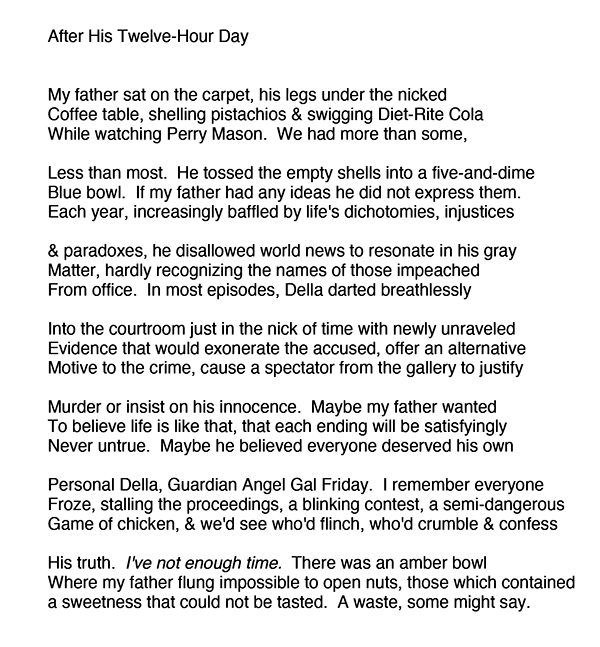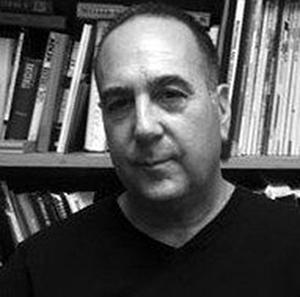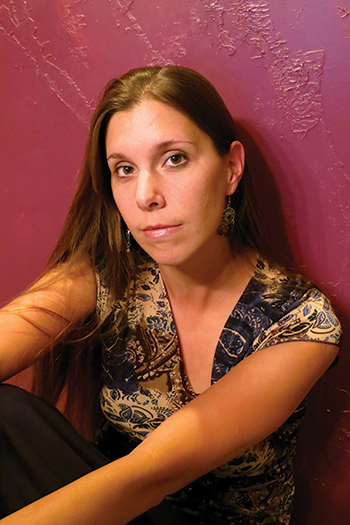Zocalo Magazine July & August 2018
Read the Digital Edition…

Heather Nagami received her M.F.A. from University of Arizona and currently teaches English and Creative Writing at BASIS Oro Valley. She is the author of Hostil e (Chax) and a member of Kore Press.
e (Chax) and a member of Kore Press.
Zócalo invites poets with Tucson connections to submit up to three original, previously unpublished (including online) poems, any style, 40 line limit per poem. Our only criterion is excellence. No online submissions. Simultaneous submissions ok if you notify ASAP of acceptance elsewhere. Please include the following contact information on each page of your manuscript: mailing address, phone number, and email address. All manuscripts must be typed and accompanied by a self-addressed, stamped envelope (SASE). Ms won’t be returned. Zócalo has first North American rights; author may re-publish with acknowledgment to Zócalo. Payment is a one year subscription. Address submissions to Zócalo, Poetry, P.O. Box 1171, Tucson, AZ 85702. The poetry editor is Jefferson Carter.
WEATHER CHANGE
for Terry Harvey
Wind slithers through oleander leaves like
schools of silver salmon ghosts, the iced relics of steelhead
fins, silver lining a rainbow trout’s cheeks.
Sky chills even hidden scars, and the voices of birds
are far away water trickling over a granite ledge.
Call out the colors of air, sweet,
filling the dusky lungs of a brother
in the last veteran’s hospice bed, air
for the lungs of women in Kabul who secretly perm
the hair of other women in their homes
while husbands cloister, click beads
and tongues at the backs of their tight throats, ignoring
the slight tilt of words said by wives
whose bodies are smothered
by centuries of swaddling cloths,
by the slavery of veils. Call sweet air.
Air for the premature baby across town
whose lungs are smaller than moth wings
struggling for flight in a neo-natal unit, air
for the homeless man wandering
paved drives in our foothills community
still asleep. Where am I, he wonders
as he staggers under a backpack
so grimy that Its history has no color
other than char. Air
for the pit bull snoring
in a treeless barrio yard, chained
to a stake broiling in desert sun
while a teen dealer bags meth
in his mother’s bathroom.
Air for the kid whose hands close
on the first baseball of his life, for the proton
in the eye of the observer that changes
what a woman sees as love halfway
across the globe. Air for all of us,
breathing sky’s
luminous unbiased mind,
the way quietly, it says goodbye. Lives.
–Pam Uschuk

Pam Uschuk is a human rights activist whose books include Crazy Love (American Book Award), Finding Peaches in the Desert (Tucson/Pima Literature Award) and Blood Flower. Editor-In-Chief of Cutthroat, A Journal of the Arts, Uschuk occasionally teaches poetry workshops for the University of Arizona Poetry Center.
Zócalo invites poets with Tucson connections to submit up to three original, previously unpublished (including online) poems, any style, 40 line limit per poem. Our only criterion is excellence. No online submissions. Simultaneous submissions ok if you notify ASAP of acceptance elsewhere. Please include the following contact information on each page of your manuscript: mailing address, phone number, and email address. All manuscripts must be typed and accompanied by a self-addressed, stamped envelope (SASE). Ms won’t be returned. Zócalo has first North American rights; author may re-publish with acknowledgment to Zócalo. Payment is a one year subscription. Address submissions to Zócalo, Poetry, P.O. Box 1171, Tucson, AZ 85702. The poetry editor is Jefferson Carter.
After His Twelve-Hour Day by Bruce Cohen

 “I met my lovely wife in Tucson over thirty years ago at the University of Arizona and embraced poetry there as well with my amazing teachers: Steve Orlen & Jon Anderson. My new manuscript, Imminent Disappearances, Impossible Numbers & Panoramic X-Rays, was awarded the 2015 Green Rose Prize from New Issues Press and will be published in 2016.” – Bruce Cohen
“I met my lovely wife in Tucson over thirty years ago at the University of Arizona and embraced poetry there as well with my amazing teachers: Steve Orlen & Jon Anderson. My new manuscript, Imminent Disappearances, Impossible Numbers & Panoramic X-Rays, was awarded the 2015 Green Rose Prize from New Issues Press and will be published in 2016.” – Bruce Cohen
Zócalo invites poets with Tucson connections to submit up to three original, previously unpublished (including online) poems, any style, 40 line limit per poem. Our only criterion is excellence. No online submissions. Simultaneous submissions ok if you notify ASAP of acceptance elsewhere. Please include the following contact information on each page of your manuscript: mailing address, phone number, and email address. All manuscripts must be typed and accompanied by a self-addressed, stamped envelope (SASE). Ms won’t be returned. Zócalo has first North American rights; author may re-publish with acknowledgment to Zócalo. Payment is a one year subscription. Address submissions to Zócalo, Poetry, P.O. Box 1171, Tucson, AZ 85702. The poetry editor is Jefferson Carter.

Logan Phillips: Poet, DJ, Artist, Teacher
Photo: Jimi Giannatti
In a lush desert of five seasons, the most sensory intense season is that of the late summer monsoons. When the residents watch with anticipation the clouds building through the day and pray – please give us precipitation, bring us los chubascos! Bring us the relief of release from the searing, breath stealing, oppressive humid heat. Shower our land; replenish the plants and animals, the aquifers and our souls.
These monsoons simultaneously clear away and pile up the detritus, as do the collection of poems in “Sonoran Strange.” With monsoon-like concentrated power – analogous to how the water and wind whip, shape and dance with la tierra – electric and unapologetic are the words that delve into the myriad layers of geology, history, flora, fauna, rivers, wars, pillaging, injustices, absurd realities and the mythologies of both the imperialists and those subsequently subjugated by colonialism.
Scribed by poet, performance artist and DJ Logan “Dirty Verbs” Phillips over seven years, “Sonoran Strange” offers poignant reflections by a man raised in rural Southern Arizona within sight of the border.
Phillips was born in Tombstone in 1983, where his family lived for a few years before his parents bought land near Hereford. “Our area was unincorporated, at that time it was Rural Route 1, down the middle of these beautiful rolling grasslands in the foothills of the Huachucas.”
His was an upbringing imbued by place; as a child Phillips was deeply connected to the Sonoran Desert’s space. With his canine companions, Logan would wander through mesquite boskets until called home for dinner. And of course, in the name of progress, the developers eventually came to claim the land.
“One day the stakes with neon flags would go up and then – no matter how many times I pulled them out – they would reappear. And then, sooner or later, one morning I would wake up and the bulldozers would have been grazing since dawn. And there was nothing left but raw, red earth. And that happened over, and over, and over, and over again. So I think it is that colonization of the land, of which my family was of course a part of, but, to be able to feel that and have it relate to losing my childhood innocence and – you know, when the imagination of a child comes to terms with the structural reality of the society, is always kind of a psychic break and that happened to me very much in relationship to the land.”
From this core of gut wrenching disillusionment, along with an education from a father who was a park ranger and later the exhibit designer for Ft. Huachuca Museum, ensued an understanding of the tales that are told by the victors to spin the stories of genocide and environmental destruction – themes ever present in “Sonoran Strange.”
“On take your kid to work day, my dad would have me in the Ft. Huachuca crazy 1880s military building with these passageways and bookcases and one moment he is showing me this document that has an original signature from Abraham Lincoln on it and then looking at an Apache skull with it smashed out on one side and then looking at a mannequin head that had just been delivered from the mannequin head-makers of an 1880s Chiricahua Apache in a box next to taxidermy of rattlesnakes and hawks…
“My understanding of history is definitely personal, it doesn’t feel dead. A lot of times studying history, especially in books… what is history defined as? Usually it’s ‘not the present,’ and I think that is bullshit. I think there are layers rather than a timeline and as a small kid my dad was telling me these stories which gave me an understanding of layers. But then of course, that fascinates you, discovering this in middle school led me to devouring books on the Apache and weird history books that my dad would have and reading Arizona Highways religiously as a 12-year-old. And then, this (book of poems) is just, as an adult, my adult self doubling down on that same innate curiosity and relationship with la tierra.”

Logan Phillips: Poet, DJ, Artist, Teacher
Photo: Jimi Giannatti
The book’s genesis began as, Phillips calls it, a sprawling five-page poem that later got separated out into a “thread that runs through the book, the repeated narrative, kind of primary thread, that is that poem blown out, expanded out.”
Beginning in 2007, Phillips was collaborating with Adam Cooper-Terán in an effort to turn Phillips’ poems into a five sense experience. From that, the two birthed Verbo•bala Spoken Video – a multi-media performance art collaborative that features video projections and soundscapes. With their first show a resounding success, Phillips was pushed into further exploring the concepts of “Sonoran Strange,” and fleshing out the initial ideas and storylines.
“There are all these characters that started coming up, like La Llorona and Dave Grindman, and the Indigenous Insurgents and all these – almost hallucinatory spirits, people who would start to make appearances in the poems and in single lines… It’s like, ‘Wait, there’s a whole lot more.’
“If you say La Llorona haunting canals in Scottsdale, there’s a whole lot more there, what are the suburban mothers jogging at 7 a.m. after dropping the kids off at school and they see La Llorona, what’s their expectation, what’s their perception? They (the poems) were just going off into this completely unpredictable, prismatic, splintering of images and characters. Most of that work was done in 2011.”
In the fall of 2011, in the resultant wake of SB 1070 and the cries for boycotts and the realization that boycotts suck for cultural workers – an effort to understand space and place happened with the CulturalStrike delegation. It brought “50 artists from around the country and imported them here for a week and lined them up with all the best cultural actors and movers and shakers in Southern Arizona,” Phillips explains.
Participants were shuttled to the Southside and Nogales and the morgue, giving them a “really intense, visceral understanding with no expectations – just, ‘let it filter into your art, see it, feel it.’
“And that to me was a game changer because it was something I knew to be true, that visceral experience trumps political vitriol and framing. And at one of the events there as an open mic sort of thing and I read the ‘Sonoran Strange’ poem and it just – the energy, it was almost like combustion. The energy – it was the right poem at the right time with the right crowd and people not being from here and giving the response that they gave, gave me a huge energetic push. ‘Oh shit, I really need to double down on this work and see it through.’ That was September 2011. And, for the rest of the year, I was writing five hours a day.”
Phillips’ dedication to his poetic craft and concern for accuracy and balance astutely delves and drills into the history of the Sonoran Desert, pulling apart and ripping open the cover-ups. His words turn it all inside out, taking you out of your understanding, mining the depths and stripping bare what the public education’s core curriculum won’t ever share. Every word is saturated with definition, verses rife with schemes of the privileged and the solemn pain of the disenfranchised.
For example:
Under the terms of Guadalupe Hidalgo,
all Mexicans living in the new United States
were made to cut the treaty
into tiny paper squares
and hold them under their tongues
until they dissolved and the new
reality set in
– An excerpt from Sonoran Strange: Gila
This is for every mouth that once spoke Mexican
and now speaks sand just forty miles
as the vulture files from where we now stand
– An excerpt from Sonoran Strange: Cuk Son
Who banned the ethnic studies of cacti,
demanding that they learn only the waters of the Potomac
and not to question why the Santa Cruz runs dry,
why the Gila runs dry; what good is the Potomac
if the Colorado runs dry?
– An excerpt from Sonoran Strange: Carlisle
Homeland of the Chiricahua Apache, homeland of the Huachuca agave.
Where the O’odham were born, where the thunder is born;
psychogeographic landscape of myth. Hollow with limestone caverns,
punctured by prospectors. Lost treasure and endangered species.
Extinct zip codes and boomtowns and the holiest of places.
– An excerpt from Sonoran Strange: Sky Islands
The release of Sonoran Strange is on Friday, Dec. 5 at Club Congress, 311 E. Congress St., 7:30 p.m. The event includes Logan reading selections of his poetry with Gabrielle Sullivan and Joe Novelli playing tunes. Find more on Logan Phillips at DirtyVerbs.com.
Still you can see the blue under the nose
below Dia de los Muertos eye cavities,
glassy shine long splintered, littering
the dressing room to the afterlife
like the left-behind glitter
of a Bollywood star.
Though piled as if in a mass grave
the huddled shells seem content to lie close
to those alongside whom they served,
blaring and jostling along the same potholed roads,
enduring the same smears
of left-behind bubble-gum,
the indelicacies spewed
when the ride was rough.
Stripped now of muscle, stripped
of the power and strain of constant movement
they are still, left
to rust in peace.
—Farzana Marie
After the photograph by M. Reinhardt, titled “Rust in Peace.” (found at www.panoramio.com/photo/11596653)

Farzana Marie
Farzana Marie is a poet, UA doctoral candidate (Persian Lit/Creative Writing), and the President of Civil Vision International (www.civilvision.org). She is author of the nonfiction book, Hearts for Sale! A Buyer’s Guide to Winning in Afghanistan (Worldwide Writings, 2013) and a poetry chapbook, Letters to War and Lethe (Finishing Line Press, 2014). She moved to Tucson in 2008 for a military assignment and remains intoxicated by the post-monsoon scent of creosote. On December 10 at 7:30, Farzana, along with Javetta Laster and Anton Smith, will be reading her poems at Casa Libre en la Solana on 4th Avenue.
Zocalo invites poets with Tucson connections to submit up to three original, previously unpublished (including online) poems, any style, 40 line limit per poem. Our only criterion is excellence. No online submissions. Simultaneous submissions ok if you notify ASAP of acceptance elsewhere. Please include the following contact information on each page of your manuscript: mailing address, phone number, and email address. All manuscripts must be typed and accompanied by a self-addressed, stamped envelope (SASE). Ms won’t be returned. Zocalo has first North American rights; author may re-publish with acknowledgment to Zocalo. Payment is a one year subscription. Address submissions to Zocalo, Poetry, P.O. Box 1171, Tucson, AZ 85702. The poetry editor is Jefferson Carter.
POEM WRITTEN IN THE MANNER OF BILLY COLLINS
First I take out the reference to global warming,
and the extinction of the blue-backed frog,
and in addition I delete any sappy, victim-like
particulars about my childhood.
I replace the checkpoint in Syria,
and the car speeding toward it
with a cup of coffee made from fine-ground Abyssinian beans
and a string quartet on the radio, playing,
I don’t know, something by Chopin.
With a small bottle of White-Out
and the accompanying exquisite little brush,
I erase the part about the gun
used by the sergeant from Afghanistan
to blow off his commander’s head.
I paint out the fashion model
with the fantastic cheekbones
who starved herself to death,
and the billionaire who gave
every player on his football team a Cadillac
until finally there is only a clean white page, like a living room floor
where a child is on his hands and knees,
feeding a piece of lettuce to a guinea pig,
petting it softly with one finger,
thinking hard and deciding
to change its name from Joe, to Josephine.
— Tony Hoagland

Tony Hoagland, whose collections of poems include Donkey Gospel and What Narcissism Means to Me, studied with Steve Orlen and Jon Anderson at the University of Arizona in the 80s, and spent a considerable number of hours without clothes on in Sabino and Reddington Canyons.
_____________________________________________
Zócalo Magazine invites poets with Tucson connections to submit up
to three original, previously unpublished (including online) poems, any
style, 40 line limit per poem. Simultaneous submissions OK if you notify
us ASAP of acceptance elsewhere. Please include contact information on
each page of your manuscript. All manuscripts must be typed and accompanied
by a self-addressed, stamped envelope (SASE). Mss. won’t be returned.
Payment is one year’s subscription to Zócalo, which acquires first North American
rights on publication; author may re-publish with acknowledgment to Zócalo.
The poetry co-editors are Jefferson Carter and Michael Gessner.
Address submissions to Zócalo, Poetry, PO Box 1171, Tucson, AZ, 85702.
Also find us on...